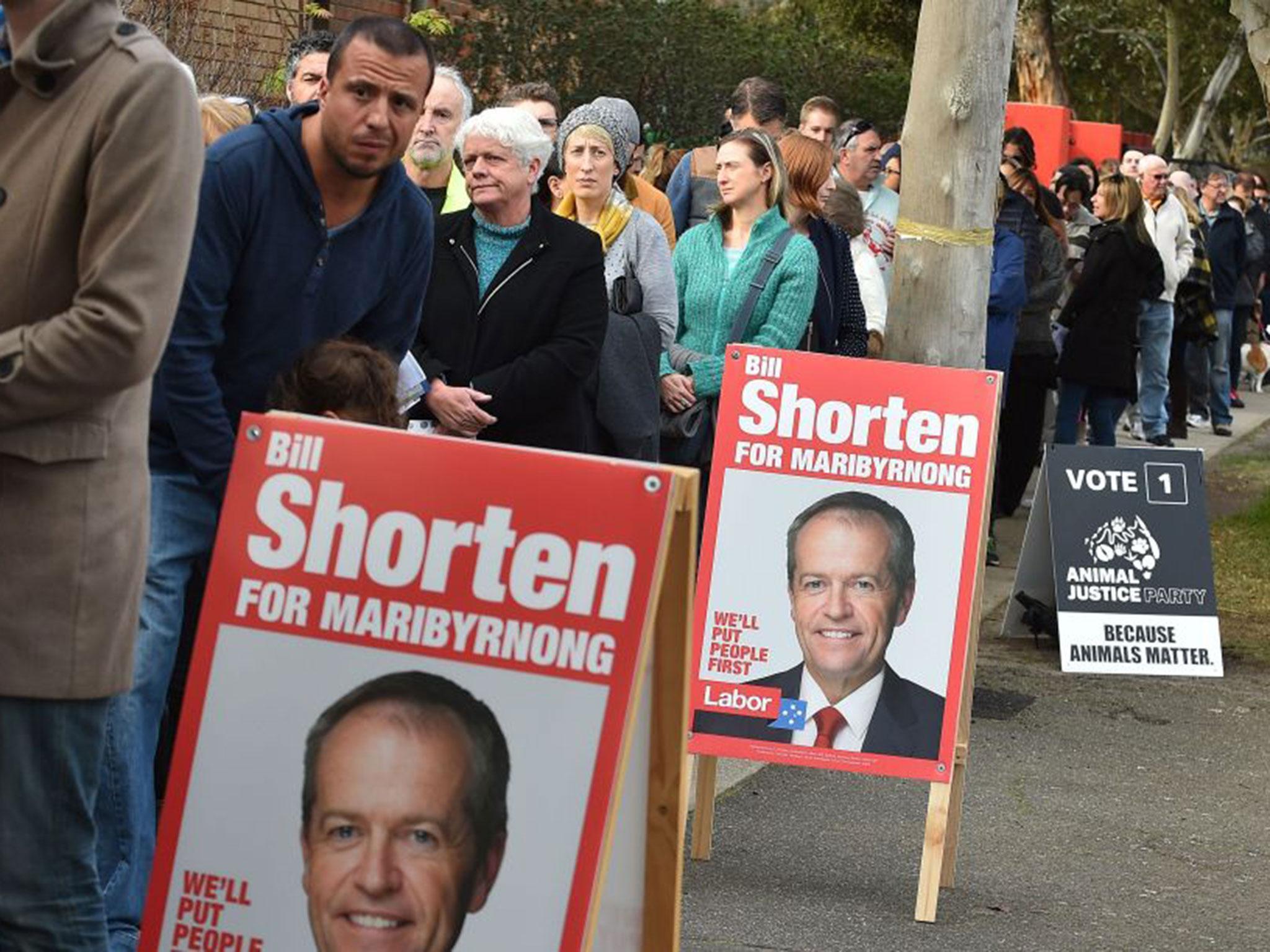Australian elections raise prospect of hung parliament, with no clear victor immediately apparent
The count was suspended on Sunday and the full results are not expected until Tuesday

Your support helps us to tell the story
From reproductive rights to climate change to Big Tech, The Independent is on the ground when the story is developing. Whether it's investigating the financials of Elon Musk's pro-Trump PAC or producing our latest documentary, 'The A Word', which shines a light on the American women fighting for reproductive rights, we know how important it is to parse out the facts from the messaging.
At such a critical moment in US history, we need reporters on the ground. Your donation allows us to keep sending journalists to speak to both sides of the story.
The Independent is trusted by Americans across the entire political spectrum. And unlike many other quality news outlets, we choose not to lock Americans out of our reporting and analysis with paywalls. We believe quality journalism should be available to everyone, paid for by those who can afford it.
Your support makes all the difference.Australia's era of political chaos continued on Saturday, with a general election failing to deliver an immediate victor and raising the prospect of a hung parliament.
Hours after the polls closed, Prime Minister Malcolm Turnbull sounded a confident tone despite early results showing his conservative Liberal Party-led coalition in a virtual tie with the opposition center-left Labor Party.
"Based on the advice I have from the party officials, we can have every confidence that we will form a coalition majority government in the next parliament," Turnbull said in a speech to cheering supporters early Sunday morning.
Opposition leader Bill Shorten did not speculate on a Labor victory but celebrated the strong swing to his party only three years after it was convincingly dumped from power in the last election.
"There is one thing for sure. The Labor Party is back," he said in a speech to supporters.
Parties need to hold at least 76 seats in the 150-seat House of Representatives to form a government. When the count was suspended early Sunday, the Australian Electoral Commission said Labor was leading in 72 seats, Turnbull's coalition in 66 seats, and minor parties or independents in five seats. Counting was less clear in another seven seats.
The final tally was not expected to be known until Tuesday, after mail-in ballots and those cast ahead of Saturday's election were counted. In past elections, these votes have favored the conservatives.
Just two possibilities remain: The coalition will win by the slimmest of margins, or there will be a hung parliament.
Turnbull called the rare early election — dubbed a "double dissolution" because both the House and the Senate are dissolved — in a bid to break a legislative deadlock over a bill that would have created a construction industry watchdog. But the result of the election may bring further deadlock: If neither party earns a majority of seats in the House, both Labor and the coalition will be forced to try to forge alliances with independent lawmakers to form a minority government.
Hung parliaments are extremely rare in Australia, with only two since 1940. The most recent was in 2010, when then-Prime Minister Julia Gillard's ruling Labor Party was forced to secure an alliance with the minor Greens party and three independent lawmakers to form a fragile minority government. Three years later, the coalition swept to power after winning 90 seats.
Treasurer Scott Morrison said he thought the coalition would ultimately be able to form a majority government once all the votes were counted. But Labor's only hope was to form a minority government.
Tony Abbott, the prime minister ousted by Turnbull in September in an internal party showdown due to poor opinion polling, declined to say on Sunday whether he would have led a stronger campaign.
"I'm just not going to speculate on that. The fact is that I didn't," Abbott told reporters outside his Sydney home. "It's obviously been an extremely tight result."
Saturday's elections continue an extraordinarily volatile period in the nation's politics, where internal party squabbling and fears over sagging poll ratings have prompted five changes of prime minister in as many years.
Amid the chaos, Labor and the coalition each tried to paint themselves as the safer, more stable choice. But selling stability was a tough job for either party, both of which have been marred by infighting in recent years. Bill Shorten played a key role in ousting two of Labor's own prime ministers in the space of three years, and Turnbull himself ousted Abbott less than a year ago. Up until 2007, conservative John Howard served as prime minister for nearly 12 years.
On Saturday, Shorten accused Turnbull of failing to deliver the economic reform and steady leadership Australians want.
"Whatever happens next week, Mr. Turnbull will never be able to claim that the people of Australia have adopted his ideological agenda," Shorten told supporters. "He will never again be able to promise the stability which he has completely failed to deliver tonight."
Monash University political expert Nick Economou said Turnbull's leadership had been terminally damaged by his decision to call the early election. It involved the longest campaign since 1969 and appeared to have delivered several hard-line social conservatives and right-wingers to the Senate that the moderate prime minister would have difficulty working with if his government survives, Economou said.
"What an amazing amount of political damage Malcolm Turnbull has been able to inflict in a very short period of time as prime minister," Economou said. "I think his credibility is shot to pieces."
Associated Press
Join our commenting forum
Join thought-provoking conversations, follow other Independent readers and see their replies
Comments